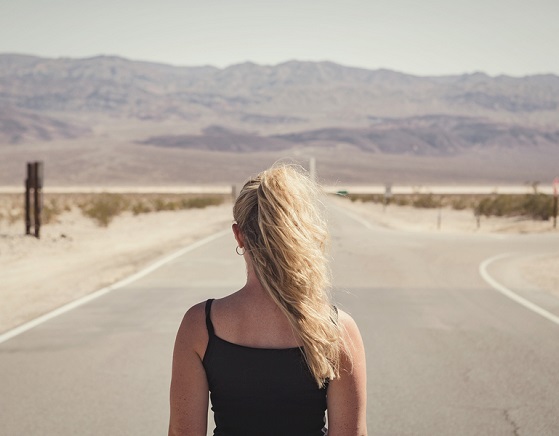We Are All on Roads Leading Us to Nowhere.

I waved at my children, barely noticeable through the darkly-tinted windows.
They stuck tips of fingers into the corners of their mouths, tugged them wider than wide, and sent their eyeballs into spirals. My laughter was halted by a quiet male voice from close behind me, “Excuse me, ma’am, but can I ask you a favor?” Startled, I turned with a jump and a small scream, followed quickly by embarrassed laughter.
The man looked down at his shoes, clearly embarrassed himself, and trying to pretend that he hadn’t noticed my surprise.
In the brief pause, my eyes landed on a blue pick-up truck now parked on the other side of the gas pump. It hadn’t been there when I had pulled into the station just moments before. He must belong to it. His truck’s bed was filled with housewares of every sort tossed haphazardly, as though packed in the dark and rush of the night.
The outside of the truck was covered in a thick layer of dust, turning the once bright blue hue to the color of a dismal sky, telling of foreboding rains. It loomed next to me, sending a shudder through my person. My body attempted to shake off the fear that had been creeping inside of me ever since I stepped out from under the shelter of my husband.
Having only $500 left in my checking account, I had already began sorting how to make my money stretch.
A flash of movement and pink from the back seat caught my eye and drew my attention back to the present. There was a boy, maybe just a year of age, tucked into a seat without any buckles to hold him fast. His messy blonde hair was shiny, but his eyes were dull, especially in comparison to those of my children’s that had just been playfully swirling in front of me.
He wasn’t tired in the typical sense relatable to children, worn out from hours of play, but he was tired. His eyes wore a weariness that broke my heart. Like this truck, he was weighted heavily by the chaos of life. I didn’t see any reflection of hope there. No lightning or response when my eyes held his own. It was as though the soul of this child had aged a 100 years in the span of only one.
These thoughts flitted through my mind in a matter of seconds — the time it took for the man with sheepish eyes to raise his gaze back toward mine. He cleared his throat and asked if he could share his story with me. I knew that my children were anxious to get driving toward our outdoor destination, but I didn’t have to be anywhere.
I nodded my consent, and he ran back to his truck where he pulled out a folder piled with papers (utility bills, rental agreement, bank statements) all bearing his name. He pulled out his ID to prove he was who he claimed to be, then told me of how he and his family were recently evicted from their apartment.
His situation was complicated by red tape in contracts that now placed holds on what little funds he had in his bank account. His request was for cash to help pay for a couple nights in a motel. I sensed that there was more to his story than he was sharing. “His wife. Where is his wife?” my mind asked. He spoke of her being ill.
Something about the way he said it and shifted his eyes back toward the paper made me suspect her illness was of the long-term sort that drains the resources of a family and nearly all the love — the illness of addiction.
I asked him to pull up closer to the gas station, and said that I would go inside and draw what funds I could spare. He started to laugh, reached his hands up in disbelief and cradled his head in them.
He looked at me with tears in his eyes and stuttered, “You don’t understand. I can’t believe you’re going to help! I was just happy to speak with someone who looked at me as a human being. Whatever you can offer, I’ll pay you back!”
I hushed him, “Don’t worry about paying me back. I’d rather you do this: when you have that money saved again, keep your eye out for another person in need and give to them as I gave to you — without any questions, just open to the life asking for help.”
His eyes locked on mine and filled with emotion. He gave a strong nod of understanding and consent in place of words. It was my turn to pretend that I didn’t notice his vulnerability. I looked across to the store and said, “Well, I’ll meet ya over there.”
Inside the store, staring down at the screen that asked how much I wanted to withdraw, I let out a sigh. I felt grateful for the house that I was still sheltered by. I felt grateful for my mother’s home that would be welcoming me and my children soon, but I couldn’t feel the gratitude for what was to come after summer. My eyes couldn’t see plenty. They saw $500 for five people for the next three weeks.
My brain couldn’t feign belief that all was well. My heart led with a feeling, alone — a memory of these values that I had planted long ago. They were seeds that offered warmth, care and love to any in need. It was my heart that raised my hand and pressed 1-0-0-.-0-0.
I gathered the bills and walked quickly outside. I placed the money in the man’s hands. He had been leaning just inside his truck with the door open. I looked back at his son who was now crying. I noticed the fresh yellow stain that soiled the old t-shirt wrapped into a makeshift diaper.
My children didn’t wear diapers anymore, but I had never removed the diaper bag from my vehicle. It sat in the far recesses, waiting for an emergency. I pulled the entire bag out from the back and offered it to the man. He thanked me again, and immediately set to work changing and dressing his son.
Not wanting to linger, gawking at his plight, I said, “I’m sorry that I couldn’t do more. I wish you and your family better days. I need to get back to my children.” He turned, still holding his son, and said, “Thank you.” We shook hands, and I drove away a few minutes later. I was back on that road to Nowhere. I had met this man on his own road to Nowhere, but for a moment, we had both felt human.
A year later, I sit reflecting upon conversations held recently between members of my family who found themselves caught within that battle between their heads and their heart, regarding immigrants flooding across our own nation’s borders. I’m reminded of the Greek song, Roads to Nowhere, by Giorgos Margaritas (Γιώργος Μαργαρίτης) shared with me, recently. The last part of the song says this:
Close your eyes, it’s your turn now
Feel the pain, touch the wound
And if you even for a while, thought I belonged to you
It was night then and now it’s morning
I don’t care, don’t you care either
Where are we heading to
Your road and mine too
Are leading us to nowhere
And that’s the point of it all, really. We are all on roads leading us to Nowhere. We can work and strive to reach any amount of goals we wish to while on this earth, but we will all be buried within it soon. That makes all that we do while on this earth seem rather meaningless, but we desire meaning. What brings our lives meaning then?
I can’t speak for everyone, but for me, my life has found meaning in closing my eyes to the appearance of the man before me, so that I can feel his pain and believe just long enough that he belonged to me — that he was my brother. My life has found meaning in a handshake, feeling the form of humanity beneath my own skin. My life has found meaning in losing my mind long enough, so that my heart can be found.
***

Audrey Marie Keel claims her self-renewing hope to be her greatest strength. She is a constant dreamer who struggles to keep her feet on the ground. Fortunately, she has four children who have a knack for keeping her down to earth. There’s literally no time for dreaming some days, or nights, for that matter. She’s aspired to be many things during her short life so far, and she likes to think that she’s become a little bit of each. Her heart’s current pursuits are in the areas of writing, photography, philosophy, education, wellness and volunteering.
***
{Join us on Facebook, Twitter, Instagram & Pinterest}

